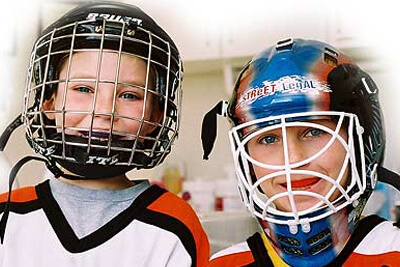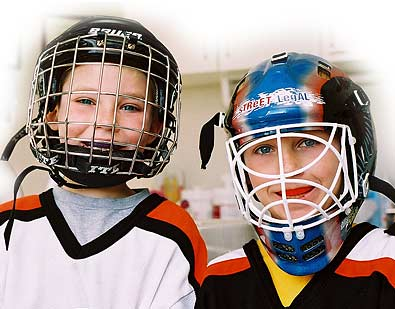
 Protecting your smile while playing sports is essential when you have braces. Mouthguards help protect your teeth and gums from injury. If you participate in basketball, boxing, hockey, football, gymnastics, lacrosse, martial arts, racquetball, rugby, track and field, skateboarding, skiing and snowboarding, skydiving, soccer, surfing, volleyball, water polo, weightlifting or wrestling, it is recommended by the Canadian Association of Orthodontists that you wear a mouthguard. The summer months, bring an increase in outdoor activities and a greater chance of damaging our precious mouths and pearly whites. If you play sports, it’s important that you consult Dr. Sharma for special precautions, such as wearing a mouthguard.
Protecting your smile while playing sports is essential when you have braces. Mouthguards help protect your teeth and gums from injury. If you participate in basketball, boxing, hockey, football, gymnastics, lacrosse, martial arts, racquetball, rugby, track and field, skateboarding, skiing and snowboarding, skydiving, soccer, surfing, volleyball, water polo, weightlifting or wrestling, it is recommended by the Canadian Association of Orthodontists that you wear a mouthguard. The summer months, bring an increase in outdoor activities and a greater chance of damaging our precious mouths and pearly whites. If you play sports, it’s important that you consult Dr. Sharma for special precautions, such as wearing a mouthguard.
According to a 2007 evaluation of the effectiveness of mouthguards in reducing injuries, the overall injury risk was 1.6 to 1.9 times greater without a mouthguard, relative to the use of mouthguards during athletic activity. Another study of collegiate basketball teams found that athletes wearing custom-made mouthguards sustained significantly fewer dental injuries than those who did not.
Mouthguards are shock absorbers that do much more than protect smiles. They play a critical role in preventing injuries to the teeth, head and neck. Made of soft plastic or laminate material, a mouthguard covers the teeth to protect them from direct blows. It also separates the upper from the lower teeth to help prevent damage that can occur when the lower teeth hit the upper teeth. Beyond this, mouthguards significantly lower the risk of a concussion by stopping the jaw joint from being driven into the base of the brain when an impact occurs. Without this protection, an athlete can suffer concussion, brain injury and/or neck injuries.
Athletic mouthguards provide protection, but vary in comfort and cost. The most effective mouthguard should be resilient, tear-resistant and comfortable. It should fit properly, be durable and easy to clean, and not restrict your speech or breathing. Generally, a mouthguard covers only the upper teeth, but in some cases, a mouthguard can be made for the lower teeth as well.
Patients can seek the assistance of Dr. Sharma and Aura Orthodontics to ensure proper mouthguard thickness and adequate protection in critical areas, based on the sporting activity. In case of any accident involving the face, check your mouth and the appliances immediately. If teeth are loosened or the appliances damaged, please schedule an appointment with Aura Orthodontics.
Like any other sports gear, a mouthguard will wear out, making it less effective. If your mouthguard has holes or tears, or if it becomes loose, it can irritate the teeth and oral tissues. Occasionally check the mouthguard’s condition and replace it as necessary.
Taking care of your mouthguard
Similar to a retainer, braces, or any other special dental appliance, it is important to take care of your mouthguard by storing it properly and keeping it clean, as well as knowing when to replace your old mouthguard with a new one. Here are a few simple ways to keep your mouthguard clean and working correctly.
- Gently scrub your mouthguard after each use with a toothbrush and toothpaste.
- Store your mouthguard in a protective case.
- Do not leave your mouthguard in the sun or in hot water, because it may melt or become deformed.
- If necessary, replace your mouthguard at the beginning of every new sports season. You should also replace your mouthguard if you notice it has become worn and no longer fits properly.
- Do not wear a retainer with your mouthguard.
- Do not chew on or cut pieces off your mouthguard. Mouthguards come in different shapes and sizes.
- Bring your mouthguard to each Orthodontic appointment, so Dr. Sharma can check to make sure it’s still in good shape.
Only by using a mouthguard and other forms of facial protection can patients with braces avoid serious sports injuries. Please give us a call if you have any questions about mouthguards or your treatment at Aura Orthodontics.





